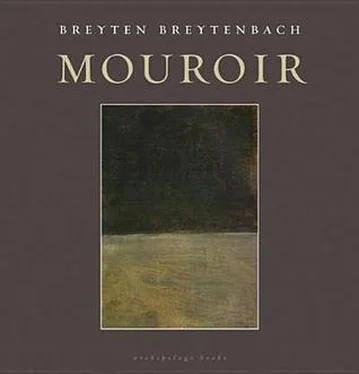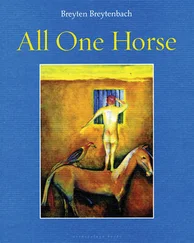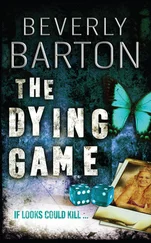Breyten Breytenbach - Mouroir
Здесь есть возможность читать онлайн «Breyten Breytenbach - Mouroir» весь текст электронной книги совершенно бесплатно (целиком полную версию без сокращений). В некоторых случаях можно слушать аудио, скачать через торрент в формате fb2 и присутствует краткое содержание. Год выпуска: 2009, Издательство: Archipelago Books, Жанр: Современная проза, на английском языке. Описание произведения, (предисловие) а так же отзывы посетителей доступны на портале библиотеки ЛибКат.
- Название:Mouroir
- Автор:
- Издательство:Archipelago Books
- Жанр:
- Год:2009
- ISBN:нет данных
- Рейтинг книги:3 / 5. Голосов: 1
-
Избранное:Добавить в избранное
- Отзывы:
-
Ваша оценка:
- 60
- 1
- 2
- 3
- 4
- 5
Mouroir: краткое содержание, описание и аннотация
Предлагаем к чтению аннотацию, описание, краткое содержание или предисловие (зависит от того, что написал сам автор книги «Mouroir»). Если вы не нашли необходимую информацию о книге — напишите в комментариях, мы постараемся отыскать её.
An outspoken human rights activist,
is a poet, novelist, memoirist, essayist, and visual artist. His paintings and drawings have been exhibited around the world. Born in South Africa, he immigrated to Paris in the late ’60s and became deeply involved in the anti-Apartheid movement. Breytenbach is the author of
, and
, among many others. He received the Alan Paton Award for
in 1994 and the prestigious Hertzog Prize for Poetry for
in 1999 and for
(
) in 2008.
Mouroir — читать онлайн бесплатно полную книгу (весь текст) целиком
Ниже представлен текст книги, разбитый по страницам. Система сохранения места последней прочитанной страницы, позволяет с удобством читать онлайн бесплатно книгу «Mouroir», без необходимости каждый раз заново искать на чём Вы остановились. Поставьте закладку, и сможете в любой момент перейти на страницу, на которой закончили чтение.
Интервал:
Закладка:
Eventually, he said, he felt that the right amount had been injected. Since it was so uncomfortable — unhygienic — consummating the act in the barn, he talked her into rather going down to the dam with him. She was reluctant to be taken outside, had very sensitive buttocks. The soft wind from the nearby marshes was rustling their clothes. The water itself was dead and weighted down. But when they came around the wall by the soft and furry grass they just about stumbled over a black labourer and his companion, naked and glowing, doing that which they themselves had in mind naturally. They would end up lying very still, he thought. He thought he knew.
Night had fallen like a hood. He then noticed, he recounted, lights going on in the central building, the one housing the dining room and kitchen and bedroom. His nephew must have returned from wherever he’d gone to. He led the woman to the house through the darkness. The dogs, he said, the dogs were snarling most viciously around their legs. In the house he asked his nephew for the use of the bedroom. To fuck the lady, he explained. They undressed by the bed in the big dark room. Her handbag on the floor. A vortex of emotions when finally unclothing. Her dress of muslin slightly lighter in the dusk. Discarded wings and sprung muscles. Flashes of light and, prevalent, areas of darkness. An orifice. As if he’d taken narceine. And the smell of vomit. Also her eyes turned up white.
“And then?”
It was, he said, a muddy matter of the vulva. Or valves perhaps.
“I couldn’t stay in her. Kept on flip-flopping out. She was too slippery. It was a sticky situation. I had used far too much of the stuff you see. There was no way. The wetness.”
(The sadness of his white finger with its stains of smoked tobacco. The sustained shiver. But it was too late: the queen had already been removed and now he was mated. The combination of black knight and black rook was fatal. There was no way out.)
The Redemption of the Image
Once is perversion, twice philosophy.
It rains as if a gigantic watch, a fat onion, had long been clogged, at last burst open, and now may release all its ticks abundantly . Shall we go further? If we have waterboots and raincapes yes. My grandfather carries an onion-shaped watch on a chain in his waistcoat pocket. The watch, just like an onion, has many shells, peels. With his knotted old man’s hands dated with brown liver-spots he opens the lids, one after another unto the last one of glass. The glass you mustn’t open up otherwise time will run delirious. Quicksilver. Under the glass the flywheels pivot, the cogs circle, the hands comb, the mechanism quirks with the movement of water. My grandfather’s watch must be leaking. He doesn’t even notice it. His pocket is growing heavier causing his back to bend. “I do wonder what time it is,” he says, fumbling his ancient fingers all down the chain. But the hands have become too slippery. When the load becomes unbearable he snaps and he is dead. Tch-tch-tch go the tongues of the family. Some say he died from water on the heart. Others maintain he must have had a poisoned onion. Or simply that his time had come. It is the breaking of the water. His time was done. It became too much. He passed away like showering rain and now there are no more clouds. I peer through the glass caps of his eyes. The frequencies are fixed, the indication of time-passage isolated and breathlessly caught on the bridge between one second and the next. Already gone from the one but never arrived at the non-one. We enclose him in a box, the one lid on the other. Hammer in the nails rhythmically. Fill the box with ticks. We shake the coffin but the guts refuse to get going again. We carry him to earth. Shall we go further? If we have raincapes and waterboots indeed. It is the planting season. There are tears in the eyes of the family as if they’d been peeling onions. Above the huge dark clouds, each with an internal movement, an accumulation — like watches without circumference. I look for an heirloom. What became of the old pocket watch? I return to the hole in the earth, put in the spade: the trough is filled with water. Time has devoured the very mechanism. Wheels and shafts lie under the water like disbanded bones. There must have been cellular decadence, the blueprint is destroyed and now there is licentious procreation, a frenetic vanishing. Dissipation. Onions will do well along here, the earth is nice and sandy. A pity it is so wet. I go looking for an onion. Tie it on a string to my waistcoat pocket because I have no confidence in links. When I hold it to the ear I can hear the ticks. The raven will build a nest of sticks. It is darkly working up for rain. Shall we go further? On the roof the rain comes down tic-tac-toc. Fat, onion-coloured little watches are shattered. Time flows away in water. It’s raining like homeless precise delimitations searching for the secure restraint of a timepiece, a grave.
This Little Flea
My acquaintance, Monsieur Keuner, had this little flea. A wonderful little chap not much bigger than a pittance with curly hair and chubby cheeks. To look at you would say just straw and stray, but so full of life and laughter. I got to know them from drinking my first cup of black coffee every morning in the same bistro they stopped at for their café crème and pain beurré on their way to school. Yes, I envied Monsieur Keuner his flea. And so I cultivated their friendship, hailed them with a bouncing bonjour, laughed with their laughing, nodded with their unimportant projects for the future of the day. Until Monsieur Keuner allowed me occasionally to accompany them part of the way, even to carry and fondle the flea. One day, a Saturday just before school, I invited them to come and see where I live. My flat was on the top floor of an old town house only a few numbers down the same street from the bistro on the corner. One entered through the big porte-cochère giving on to the roughly paved inner courtyard with at the other end the broad staircase leading up to the étages . I took them through the green-dark courtyard and at the foot of the stairs I held up the flea in my hand to explain how one climbed and climbed until one reached my front door. Yes, I was tracing all of this with the hope that the flea now laughing in my hand would perhaps remember to come visit me, who knows, all on his own. At that moment the door of the first-floor apartment opened with a black noise and Madame Gasolini appeared on the landing. Ah, the bitch! Always was one, in barren heat, quarrelling, snarling, sniping and snooping. She screamed a stream of words to the effect that she would certainly not allow any flea to enter this building, and many other imprecations. I wanted to stand my ground, should have, felt like telling her to go and have a crap in her best infertile bloomers. But didn’t. Madame Gasolini is an imposing woman with very thick lungs. I found myself back with Monsieur Keuner at the street entrance to the building and to my sudden horror realized that I must inadvertently have dropped the flea among the paving stones. I bent over here and stooped there and all to no avail. I even felt with my fingers along the crack until all at once a hairy red spider crawled out and bit me in the index. Monsieur Keuner had two silent thin eyes. The wonderful little flea was lost and just another flea by now. And yet one knew that it was piteously crying out for succour somewhere near at hand. If only one could see as far as one’s nose!
Book, a Mirror
Bientôt nous plongerons dans les froides ténèbres. .
BAUDELAIRE“During this period the evenings become purple. This phenomenon should probably be ascribed to the fluctuation of seasons — change summed up in a combination of factors: the days longer and ever warmer so that more unused light is left over at the fall of evening; even when day has already died the evening initially has more light and is, apparently, reluctant to confound itself with the pillared portals of darkness; evenings thus have more of a glimmer and the transitions aren’t abrupt or clogged; the heat of the elapsed day causes a partial evaporation more visible above the horizons and the resulting condensation becomes a prism and acts as a refractor of the death-flame’s longer rays; simultaneously the earth is more powdery day by day and languishing dust clouds, as if the planet were a coach on the dusty road of space, contribute to the manifestation of staining; and the plant life and harvests, both cultivated and indigenous, have just about attained the fullness of their growth, leaves and blades are swollen with sap and the green which will fade a lighter shade as the buds burst forth and the small fruits become fruit, develop flesh and cheek and eyebrow and form around the thought-kernel of the stone, are as yet blue with greenness. All of this taken together and being gathered in a larger totality creates the effect of evenings having for a brief transitional period — between day’s sharply outlined depths and night’s approach, but also between one season and the next — a purple cape being dragged lightly over the ridges of the amphitheatre. ‘Cape’ and ‘light’ — words bringing to mind a bullfight, the ‘at five o’clock in the afternoon’, the moment of truth during the faena , the final quites with the sword cloth, the muleta which is already impregnated with blood and the rosy froth around the nostrils of the bull being driven back, plod-hoofed now in the querencia which no longer offers any protection against the swordbright piercing of death, the eyes also of a light red colour but already glassy and less mobile, and the matador on his toes, with love and respect and arrogance, he is going to do it from the front in a recibir , he takes aim down the silver beam; it brings to mind the dark roaring of the crowd, the handkerchiefs like so many butterflies when darkness descends. But this is no treatise on bullfighting. Hemingway proclaimed: ‘The author should tell us only of that part of the external world which the consciousness of the hero perceives in the moment the two coincide.’ A symbiosis: the mutually beneficial internal relationship between two organisms of different nature. It is all very well, even though the danger exists that this statement, narrowly interpreted, may lead to a blinkered vision. Isn’t the consciousness of the outside world, the non-I, often exactly the explosion point of a boundless stream of associations breaking free in the I? Isn’t Lowry’s consul closer to reality than Hemingway’s Robert Jordan? And the true nature of the observer, that consciousness, cannot be circumscribed by the human mind since that mind knows only of objects: that which I name ‘I’ is in no sense I. With the best comprehension in the world the self remains merely a little bundle consisting of five tendencies, five skandhas or branches — form, emotions, observing faculties, characteristics and spiritual powers or discrimination, also the idea of the self among others. (There must be a new tearing: the hole-in-the-belly experience of such-ness, tathatā̄ , which is the void, sunyata , empty of all imaginable things or ideas.) Besides, Hemingway is cheating. It is true that we are being made aware at a given moment, through lean and tense descriptions, of the interpenetrating and mutually complementary protagonist and surroundings, but we become especially attentive to that which is not expressed. And who is the observer? Is the mood in which we are placed or transposed by the description — better still, by the way of describing — experienced by the hero as well? Isn’t one of Hemingway’s ‘manly’ attributes really that we are seldom offered a glimpse of the hero’s way of consciousness or even his perceptions? Unless the telling is unfolding from the point of view of the first person of course, one can say a personal I. Unfolding like the cape before the nose of the snorting bull. . Or should it be argued that Hemingway, in his non-first-person stories, succeeds in creating a certain symbiosis between the invisible narrator (the absent I on the spot) and the indicated third person or hero? Are we therefore served the writer and the writer’s writing writhing in the awareness of the penned-down character? Are we led by a ring through the nose? ‘You can make an ox of the bull but he still remains a beast. . ’ But this here is not an attempt at polemics, nor an analysis nor even an approach to Papa Hemingway’s theories. It is only: a tentative description of the moth chamber which Angelo and his wife, Giovanna Cenami, so much wanted to see. (Concerning the moth chamber more extensively later on.) At the same time the viewing of the moth chamber will give them the chance to spend a few days with Gregor Samsa and Elefteria. Angelo had already developed guilt feelings concerning the companion of his youth. It is true that he had promised repeatedly to go there on a visit… True too that Angelo, pressed by his wide-ranging activities as a writer, only very seldom could find the time-space for going away a few days. And that he shrank from the idea of a trip to the highlands. The heights in more ways than one. But after the telephone conversation with Elefteria of last week a plan will just have to be made. No excuse will let him off the hook concerning his responsibilities to Gregor Samsa. For, according to Elefteria, it is not at all going well with her husband. His work, the demands made upon him — all these, it would seem, are grinding him down. Would it not be possible, Elefteria asked, for Angelo and wife to come spend a day or more with them. . ”
Читать дальшеИнтервал:
Закладка:
Похожие книги на «Mouroir»
Представляем Вашему вниманию похожие книги на «Mouroir» списком для выбора. Мы отобрали схожую по названию и смыслу литературу в надежде предоставить читателям больше вариантов отыскать новые, интересные, ещё непрочитанные произведения.
Обсуждение, отзывы о книге «Mouroir» и просто собственные мнения читателей. Оставьте ваши комментарии, напишите, что Вы думаете о произведении, его смысле или главных героях. Укажите что конкретно понравилось, а что нет, и почему Вы так считаете.












